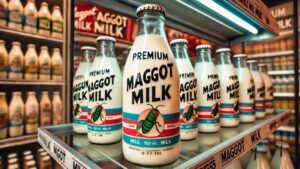(SQAUK) — In the constantly changing food innovation space, Bill Gates has made a surprising move by introducing “maggot milk” as a potential dairy alternative. Although the concept may initially spark skepticism or disgust, this new product could provide the sustainable solution the world urgently requires. In the end, it might just end up becoming something you love.
Maggot milk is produced from the larvae of black soldier flies, insects known for efficiently converting organic waste into high-quality protein and nutrients. The concept of maggot milk is based on sustainability. Traditional dairy farming is resource-intensive, requiring large amounts of water, feed, and land. In contrast, black soldier fly larvae can be raised on organic waste, significantly reducing the environmental footprint.
Bill Gates, known for his forward-thinking approach and investments in sustainable technologies, has been championing maggot milk as a potential game-changer in the food industry. He argues that we need to explore unconventional but highly efficient food sources to meet the growing global demand for protein while mitigating climate change.

Maggot milk is not just an environmental marvel; it’s also packed with essential nutrients. It boasts high protein content, is rich in essential amino acids, and is fortified with vitamins and minerals comparable to, if not exceeding, those found in cow’s milk. Additionally, maggot milk is lactose-free, making it a tasty alternative for those with lactose intolerance.
Studies have shown that maggot milk contains healthy fats and a unique blend of micronutrients that can support overall health. Converting larvae into milk involves sophisticated technology that ensures the final product is safe, palatable, and nutritious.
Promoting maggot milk requires overcoming the initial repulsion many people feel towards insects. However, it’s important to note that eating insects, known as entomophagy, is common in many cultures worldwide. The key lies in how the product is marketed and presented to consumers.
Bill Gates and his team are developing innovative ways to process and flavor maggot milk to make it more appealing. By incorporating familiar flavors and textures, they aim to make maggot milk indistinguishable from traditional dairy products. Early taste tests have shown promising results, with many participants unable to differentiate between maggot and conventional milk.
The environmental benefits of maggot milk are substantial. Black soldier fly farming requires a fraction of the land and water used in traditional dairy farming. Moreover, these larvae can thrive on organic waste, helping to reduce food waste while producing high-quality protein.
Bill Gates envisions a future where maggot milk could be crucial in reducing greenhouse gas emissions and conserving natural resources. By embracing such sustainable practices, we can make significant strides towards a more eco-friendly and resilient food system.
The journey of maggot milk from concept to mainstream acceptance is still ongoing. However, the future looks promising, with influential advocates like Bill Gates and the growing recognition of the need for sustainable food sources. As consumers become more aware of the environmental impact of their food choices, the demand for innovative and sustainable alternatives, like maggot milk, is likely to increase.
Although maggot milk may initially seem unappetizing, its potential health and environmental benefits make it a compelling alternative to traditional dairy products. With ongoing innovation and effective marketing, maggot milk could soon become a household staple worldwide, contributing to a more sustainable future.


